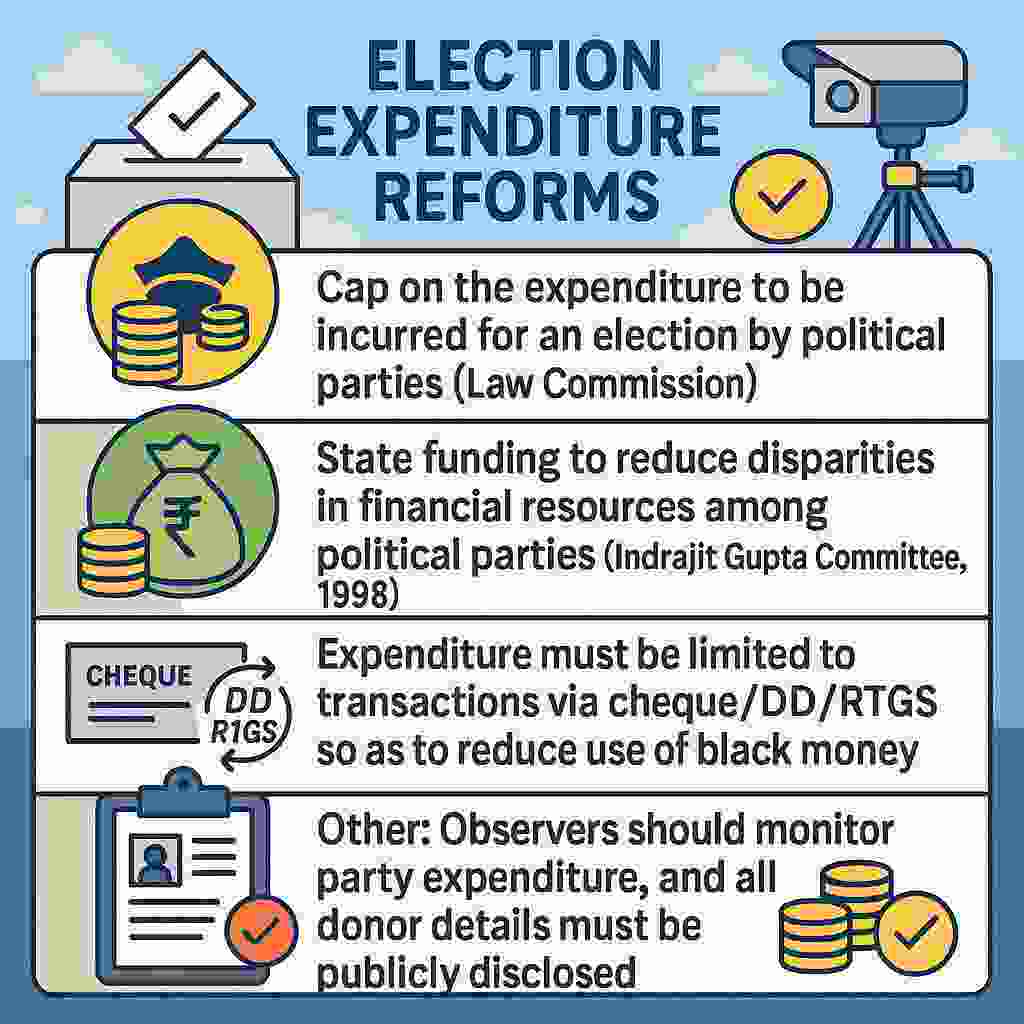Relevance: GS II Salient Features of RPA Act
Why in News
The Association for Democratic Reforms (ADR) study states that during the general elections of 2024, a number of parties failed to submit their expenditure disclosures at all, while others did so after a delay of one to 232 days.
Legal Framework for Political Expenditure Reporting
Within 90 days following a general election and 75 days following an assembly election, political parties must provide the ECl with election expenditure statements. Serious questions concerning accountability and openness in political fundraising have been highlighted by widespread non-compliance.
- The cost of the 2024 Lok Sabha Election reached 1.35 lakh crore, making it the most costly election in history.

The Crisis of Transparency
From 2004–05 to 2022–23, around 60% of donations to India’s six main political parties came from unidentified sources. For instance, national parties received more than 93% of all money in the general elections of 2024, which raised questions about fair play and disproportionate financial dominance.
- Although ECI has set spending limits (95 lakh for the Lok Sabha and 740 lakh for the Assembly), actual spending frequently surpasses these limits with the aid of outside campaigners and violations of the Model Code of Conduct.
- Having money is crucial for winning elections, which limits the chances of less wealthy candidates.
- For instance, 44% of the victorious candidates in Madhya Pradesh reported having assets over 75 crore.
Note: Stay informed about the most recent UPSC current Affairs, where we provide clear explanations of the major stories.
Proposed Reforms: Towards Clean and Fair Elections
A cap on the amount of money political parties can spend on an election (Law Commission). Funding from the state to lessen the differences in political parties’ financial resources (Indrajit Gupta Committee, 1998).
- To prevent the use of black money (ADR), spending must be restricted to transactions made by check, DD, or RTGS.
- All donor information must be made public, and observers should keep an eye on party spending.
Mains:
Question: “The growing financial opacity in Indian elections undermines the core principles of democracy.” Critically examine in the context of the 2024 General Elections.
Mains PYQs
Question: In the light of recent controversy regarding the use of Electronic Voting Machines (EVM), what are the challenges before the Election Commission of India to ensure the trustworthiness of elections in India? (UPSC 2018)
MCQs
Question: Which of the following are among the proposed reforms to improve transparency in political financing in India?
- Capping total expenditure by political parties.
- Mandatory digital transactions for campaign finance.
- Publishing all donor information in the public domain.
- Abolishing the Election Commission’s Model Code of Conduct.
Select the correct answer using the code below:
- a) 1 and 2 only
- b) 2 and 3 only
- c) 1, 2 and 3 only
- d) 1, 2, 3 and 4
Answer: c)
Note: To take practice tests on Daily current Affairs MCQs, click the link that is attached.
MCQ PYQs
Question: Consider the following statements:
- The Election Commission of India is a five-member body.
- Union Ministry of Home Affairs decides the election schedule for the conduct of both general elections and bye-elections.
- The Election Commission resolves the disputes relating to splits/mergers of recognized political parties.
Which of the statements given above is/are correct?
- a) 1 and 2 only
- b) 2 only
- c) 2 and 3 only
- d) 3 only
Answer : d) (2017)
Source: DOGE says cancelled $21 mn grant for India ‘voter turnout’.
UPSC General Studies Paper Preparation
| Topic | |
| UPSC Syllabus | GS Genius-50 Program |
| Public administration crash course | UPSC GS Mains 2025 Study Material |
| About the Author: Nitin Kumar Singh |



